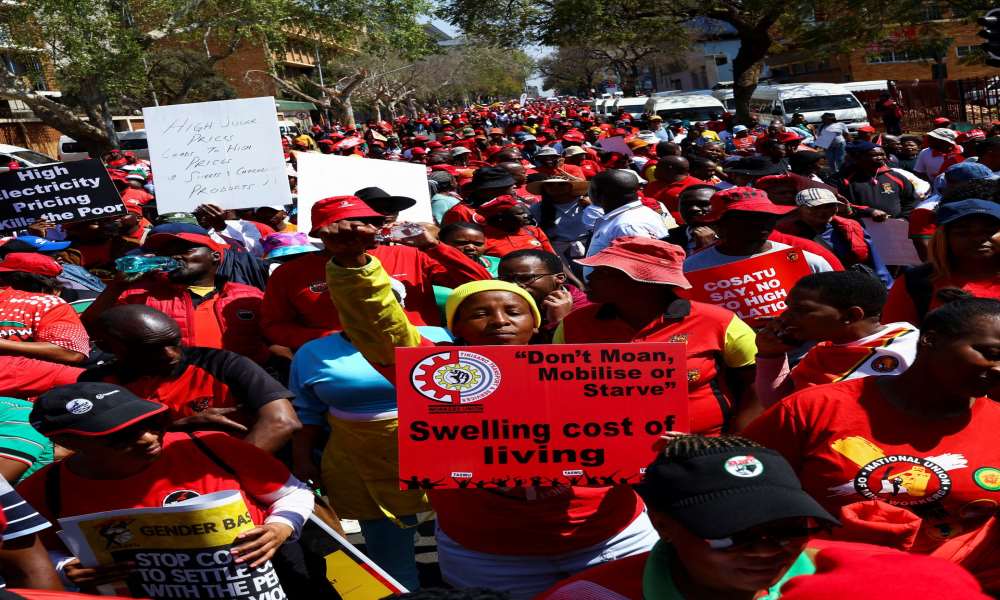Public sector unions in South Africa to strike
Certificate granted
Government has stuck to its 3% offer, which unions have rejected.
Public service labour unions affiliated with the South African Federation of Trade Unions (Saftu), which include the police, have been issued a certificate allowing them to embark on a legal strike after failing to break a wage impasse with the Public Service Coordinating Bargaining Council (PSCBC).
The unions, which include the South African Policing Union (SAPU) and the National Union of Public Service and Allied Workers (Nupsaw), on Tuesday held conciliation talks with a Commission for Conciliation, Mediation and Arbitration (CCMA) commissioner in a bid to resolve the wage deadlock. Government has stuck to its 3% offer, which unions have rejected.
The 3% wage offer is an increase from the 2% tabled in the earlier stages of negotiations by the employer.
Saftu national spokesperson Trevor Shaku said the talks did with the mediator did not yield a positive result, and a certificate of non-resolution was issued by the PSCBC.
"It means we can now prepare for a possible strike, but first we have to ballot our members and reach the necessary threshold that would allow us to go on strike," said Shaku, adding that the 3% offer was below the inflation rate of 6.5% forecast for 2022.
The wage negotiations began in May, with unions demanding a 10% wage hike. SAPU has revised its demand to 8%, while a number of other unions want 6.5%.
General secretary of PSCBC, Frikkie de Bruin, said the certificate of non-resolution was issued to SAPU and Public Servants Association (PSA). But he added that "SAPU members cannot go on strike as they work in essential service".
Salary
Unions under the Saftu umbrella declared a dispute three weeks ago. The 3% pensionable salary adjustment offer is for employees on salary levels 1 to 12 employed in the public service on or before 1 April 2022.
PSA assistant general manager Reuben Maleka said the union, which has about 235 000 members, had not yet rejected the offer.
"We are still in the mandating process, and we will pronounce once we have ensured the process was fair and objective," he said. If the union rejects the 3% wage increase offer and embarks on a strike, it would be the union's first industrial action in 12 years.
Simon Hlungwani, chief negotiator for unions affiliated to Cosatu, said they were still seeking a mandate from various member unions on the way forward. The Cosatu-aligned unions expect to finalise their position by Friday.
SAPU's spokesperson, Lesiba Thobakgale, called on unions to unite against the proposed wage offer, saying it would fail to cushion the workers against the rising cost of fuel, food and high inflation.
"Any union that would accept this offer is not representing the workers but is an employer representative," said Thobakgale, adding that they were ready to strike.
The last major strike in the public sector was in 2010, affecting schools and other public services. -Fin24
The unions, which include the South African Policing Union (SAPU) and the National Union of Public Service and Allied Workers (Nupsaw), on Tuesday held conciliation talks with a Commission for Conciliation, Mediation and Arbitration (CCMA) commissioner in a bid to resolve the wage deadlock. Government has stuck to its 3% offer, which unions have rejected.
The 3% wage offer is an increase from the 2% tabled in the earlier stages of negotiations by the employer.
Saftu national spokesperson Trevor Shaku said the talks did with the mediator did not yield a positive result, and a certificate of non-resolution was issued by the PSCBC.
"It means we can now prepare for a possible strike, but first we have to ballot our members and reach the necessary threshold that would allow us to go on strike," said Shaku, adding that the 3% offer was below the inflation rate of 6.5% forecast for 2022.
The wage negotiations began in May, with unions demanding a 10% wage hike. SAPU has revised its demand to 8%, while a number of other unions want 6.5%.
General secretary of PSCBC, Frikkie de Bruin, said the certificate of non-resolution was issued to SAPU and Public Servants Association (PSA). But he added that "SAPU members cannot go on strike as they work in essential service".
Salary
Unions under the Saftu umbrella declared a dispute three weeks ago. The 3% pensionable salary adjustment offer is for employees on salary levels 1 to 12 employed in the public service on or before 1 April 2022.
PSA assistant general manager Reuben Maleka said the union, which has about 235 000 members, had not yet rejected the offer.
"We are still in the mandating process, and we will pronounce once we have ensured the process was fair and objective," he said. If the union rejects the 3% wage increase offer and embarks on a strike, it would be the union's first industrial action in 12 years.
Simon Hlungwani, chief negotiator for unions affiliated to Cosatu, said they were still seeking a mandate from various member unions on the way forward. The Cosatu-aligned unions expect to finalise their position by Friday.
SAPU's spokesperson, Lesiba Thobakgale, called on unions to unite against the proposed wage offer, saying it would fail to cushion the workers against the rising cost of fuel, food and high inflation.
"Any union that would accept this offer is not representing the workers but is an employer representative," said Thobakgale, adding that they were ready to strike.
The last major strike in the public sector was in 2010, affecting schools and other public services. -Fin24




Kommentaar
Republikein
Geen kommentaar is op hierdie artikel gelaat nie